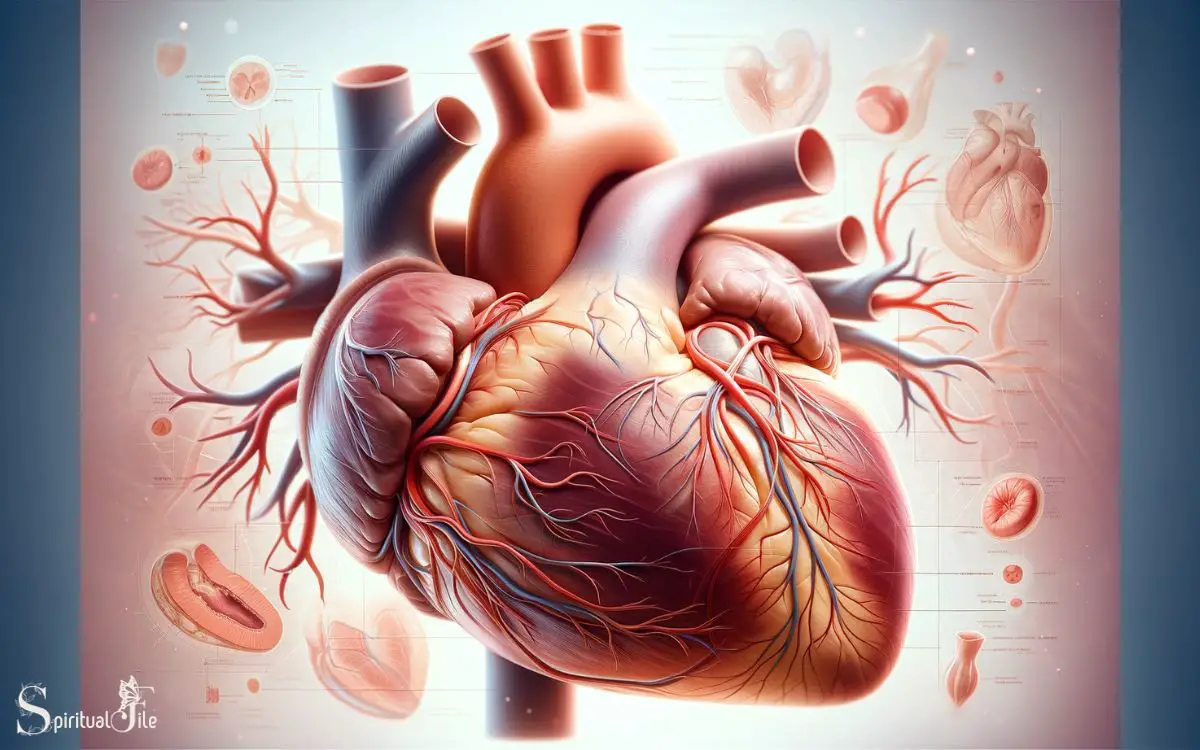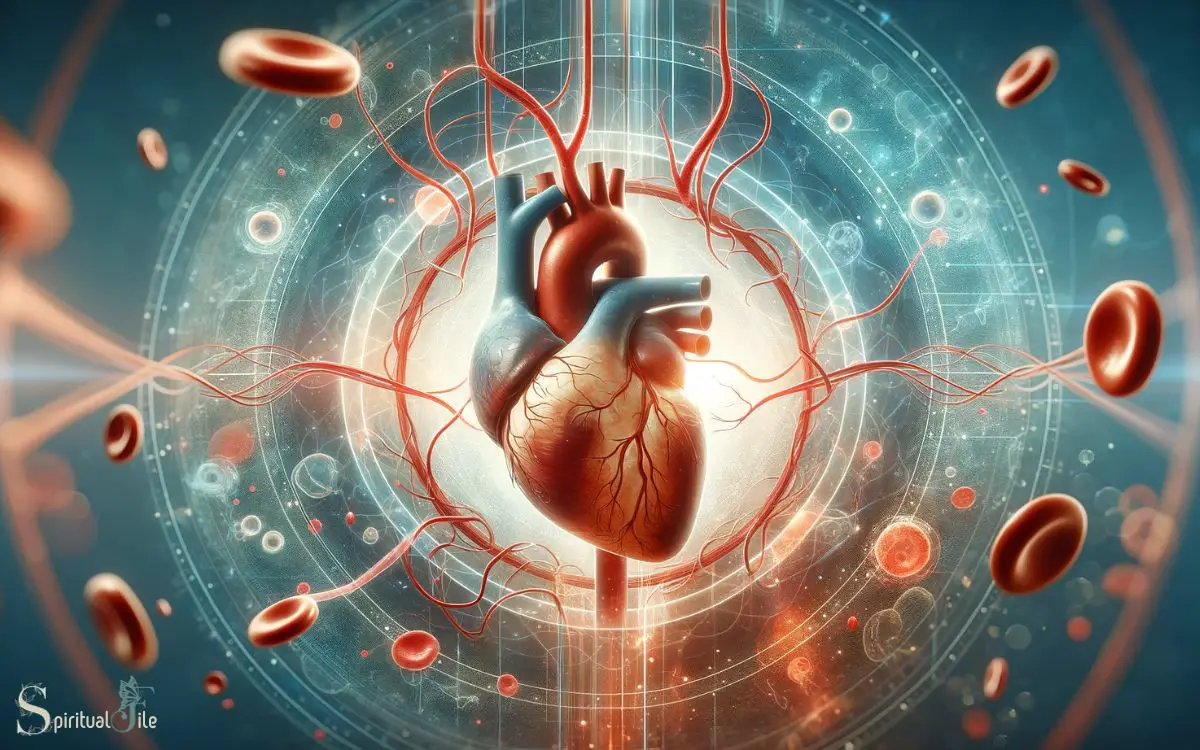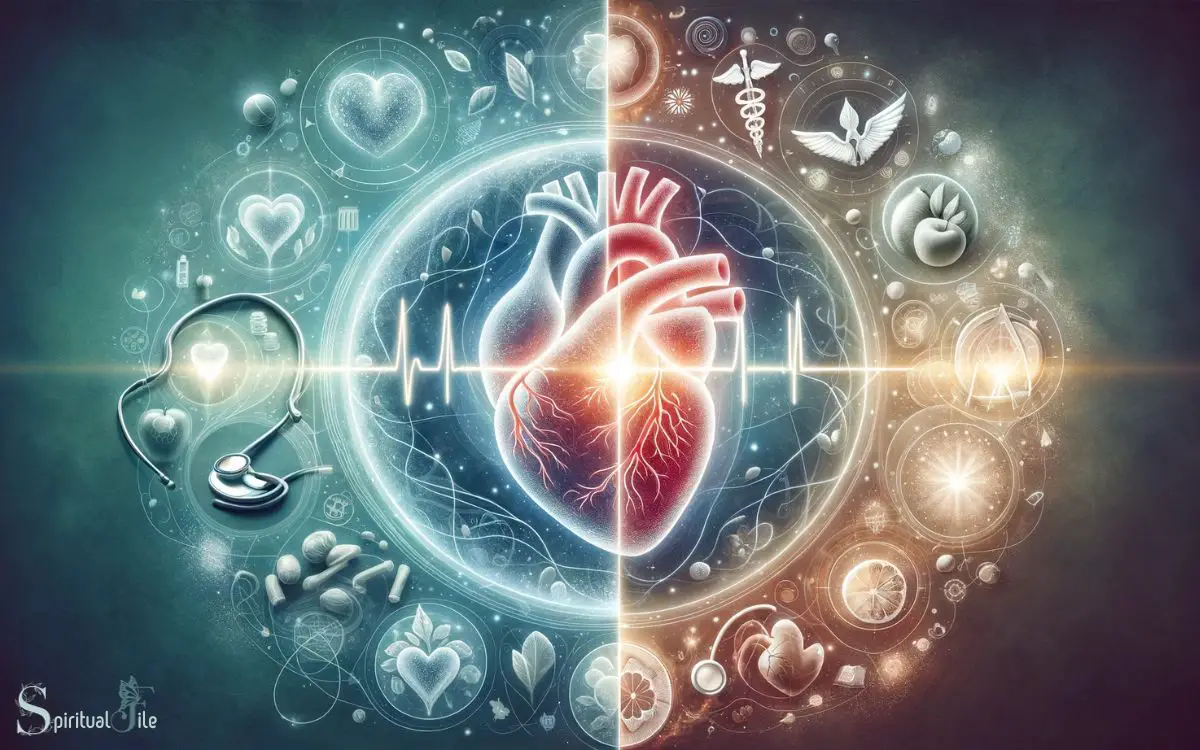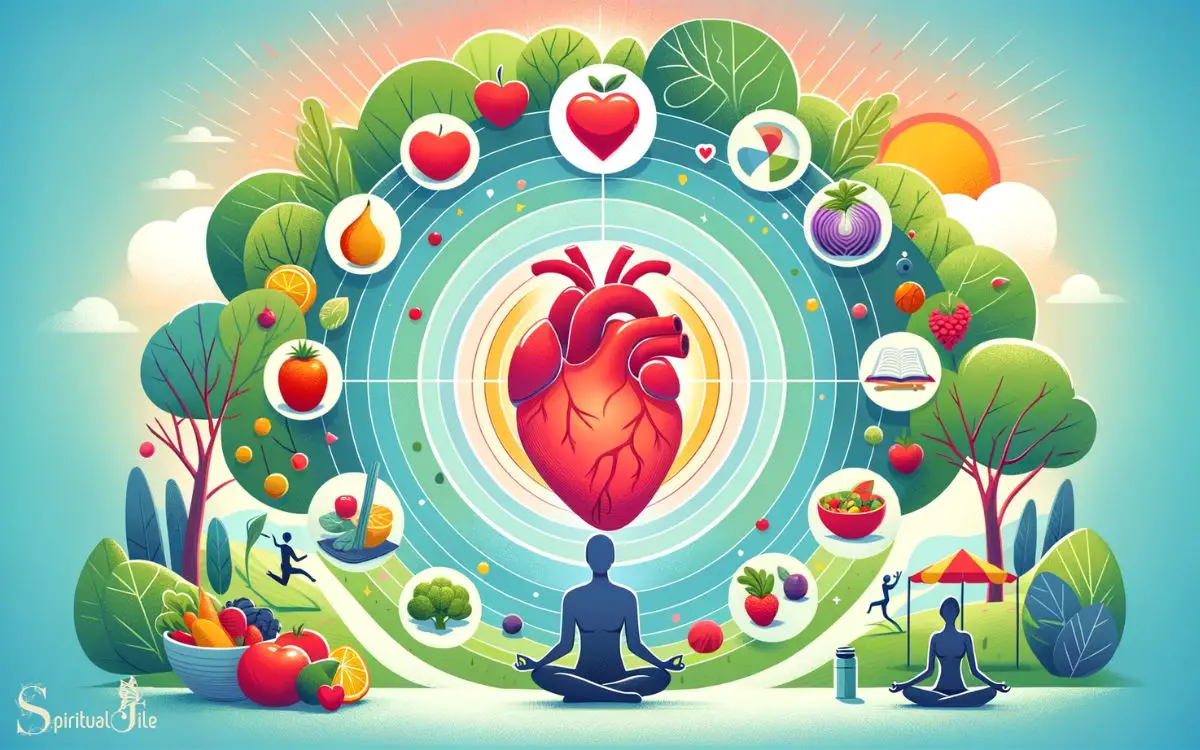Physical Heart Vs Spiritual Heart: Center of Emotions!
The physical heart is a vital organ responsible for pumping blood throughout the body, maintaining circulation and supplying oxygen and nutrients.
On the other hand, the spiritual heart is a metaphorical concept often associated with the center of emotions, moral compass, and intuitive understanding.
This comprehensive guide explores both the scientific functions of the physical heart and the philosophical interpretations of the spiritual heart to provide a well-rounded perspective on the significance of heart health.
The Physical Heart:
- Average beats per day: Approximately 100,000
- Volume of blood pumped: Roughly 2,000 gallons daily
- Primary function: Circulation of blood, provision of oxygen and nutrients
The Spiritual Heart:
- Represents: Emotional center, moral integrity, and inner wisdom
- Significance: Explored in various philosophical and religious contexts as a source of love, compassion, and spiritual connection
For example, in a medical context, a cardiologist might discuss the health of a patient’s physical heart by measuring its rate and rhythm. In contrast, a spiritual leader may speak of the spiritual heart in terms of one’s ability to love and connect with others.

Key Takeaway
5 Aspects: Physical Heart Vs Spiritual Heart
| Aspect | Physical Heart | Spiritual Heart |
|---|---|---|
| Physical Location | In the chest, vital organ | Metaphorical, within the soul |
| Function | Pumps blood, sustains life | Symbolizes love, compassion, and inner essence |
| Biological Aspect | Anatomical structure | Symbolic and emotional significance |
| Health | Subject to medical issues | Represents emotional well-being |
| Science | Studied by cardiology | Addressed in spiritual and philosophical contexts |
Anatomy of the Physical Heart

Discussing the anatomy of the physical heart is fundamental for understanding its structure and function in the human body.
The heart is a muscular organ located between the lungs, slightly left of the middle of the chest. It is enclosed in a double-walled sac called the pericardium.
The heart is divided into four chambers: the upper two are called atria, and the lower two are the ventricles.
The right atrium receives deoxygenated blood from the body and pumps it into the right ventricle, which then sends it to the lungs to be oxygenated.
The left atrium receives oxygenated blood from the lungs and passes it to the left ventricle, which then pumps it out to the rest of the body.
Understanding this basic anatomy is crucial for appreciating the heart’s vital role in maintaining circulation.
Function and Importance of the Physical Heart

Continuing from the previous subtopic on the anatomy of the physical heart, it is essential to comprehend the function and significance of this vital organ in maintaining circulation and overall health.
Function of the Physical Heart:
- The heart pumps oxygenated blood to the body and deoxygenated blood to the lungs, supporting vital bodily functions.
- It maintains blood pressure, ensuring that all organs receive the necessary oxygen and nutrients.
Understanding the function of the physical heart allows for an appreciation of its crucial role in sustaining life. It is not merely a muscle but a complex organ that plays a fundamental role in maintaining overall health and well-being.
The Spiritual Heart in Philosophical and Religious Contexts

The spiritual heart holds significant philosophical and religious importance, embodying a profound symbolism and representing the core of human spirituality and emotional resonance.
In various philosophical and religious traditions, the spiritual heart is considered the seat of wisdom, conscience, and intention. It is often associated with love, compassion, and the source of inner guidance.
In many Eastern philosophies, such as Hinduism and Buddhism, the spiritual heart is seen as the center of one’s being, transcending the physical body and connecting to the divine.
Similarly, in Christianity, the spiritual heart is regarded as the place where God dwells and where true transformation and spiritual awakening occur.
Across different belief systems, the spiritual heart serves as a metaphor for the deepest aspects of human existence and the pathway to spiritual enlightenment.
Emotions and the Spiritual Heart

The connection between emotions and the spiritual heart is a topic of great significance across various philosophical and religious traditions.
Emotions are often seen as a window into one’s inner self, and exploring this connection can lead to a deeper understanding of spirituality and emotional wellbeing.
Furthermore, the role of the heart in spirituality encompasses not only emotional experiences but also the nurturing of compassion, empathy, and love.
Emotions and Inner Self
Emotions play a significant role in shaping one’s inner self, reflecting the state of the spiritual heart. Our emotions are deeply connected to our spiritual heart, influencing our thoughts, actions, and overall well-being.
Consider the following:
Impact on Inner Harmony
- Emotions can either disrupt or enhance our inner harmony, affecting our spiritual heart’s state.
- Positive emotions such as love, compassion, and gratitude contribute to a peaceful inner self, nurturing the spiritual heart.
Influence on Relationships
- Emotions shape our interactions with others, impacting the connections we form.
- Negative emotions like anger, envy, and resentment can create barriers in relationships, affecting the condition of the spiritual heart.
Understanding the influence of emotions on our inner self is essential for nurturing a healthy spiritual heart and achieving overall well-being.
Spirituality and Emotional Wellbeing
Navigating the intricate relationship between spirituality and emotional wellbeing requires a deep understanding of the impact of emotions on the spiritual heart.
Emotions are deeply intertwined with our spiritual experiences, influencing our perception of the world and our inner selves.
The table below illustrates the connection between emotions and the spiritual heart:
| Emotion | Effect on Spiritual Heart |
|---|---|
| Love | Nurtures and expands |
| Gratitude | Fosters contentment |
| Compassion | Strengthens connection |
| Forgiveness | Releases burdens |
Understanding how emotions affect the spiritual heart is essential in nurturing spiritual wellbeing. It is through this understanding that we can cultivate a sense of harmony and peace within ourselves, ultimately contributing to our spiritual growth and fulfillment.
Transitioning into the subsequent section about ‘heart’s role in spirituality’, the impact of emotional wellbeing on the spiritual heart is closely linked to the holistic understanding of the heart’s multifaceted role in spirituality.
Heart’s Role in Spirituality
Understanding the intricate relationship between emotional wellbeing and the spiritual heart is crucial for comprehending the holistic role of the heart in spirituality. The spiritual heart plays a significant role in shaping our emotions and overall spiritual wellbeing.
Here are a couple of key points to consider:
- Emotions and the Spiritual Heart
- Emotions are deeply intertwined with the spiritual heart, influencing our spiritual experiences and connections.
- The spiritual heart serves as a center for love, compassion, and empathy, nurturing our emotional state and contributing to our spiritual growth.
Recognizing the profound connection between emotions and the spiritual heart allows individuals to cultivate a deeper understanding of their spiritual journey and the impact of emotional wellbeing on their overall spiritual health.
Connection Between Physical and Spiritual Heart Health

The connection between physical and spiritual heart health is crucial for overall well-being and harmony. Both the physical and spiritual aspects of the heart are deeply intertwined, and nurturing one can positively impact the other.
The table below illustrates the connection between physical and spiritual heart health, highlighting the interrelated aspects that contribute to overall wellness.
| Physical Heart Health | Connection | Spiritual Heart Health |
|---|---|---|
| Regular exercise | Influences | Inner peace |
| Balanced diet | Affects | Compassion |
| Adequate rest | Impacts | Gratitude |
| Stress management | Links to | Forgiveness |
| Regular check-ups | Supports | Connection to others |
Understanding the connection between these two aspects of heart health is essential for achieving holistic well-being.
Transitioning into the subsequent section about ‘nurturing the spiritual heart’, it is important to explore practices and habits that promote spiritual heart health.
Nurturing the Spiritual Heart

Transitioning from the connection between physical and spiritual heart health, it is imperative to emphasize the significance of nurturing the spiritual heart for overall well-being.
Nurturing the spiritual heart involves:
- Practicing Gratitude: Cultivate a habit of acknowledging and appreciating the positive aspects of life, which can lead to a more positive outlook and emotional well-being.
- Engaging in Mindfulness and Meditation: These practices can help in centering the mind, reducing stress, and fostering a sense of inner peace and tranquility.
Nurturing the spiritual heart is essential for holistic health, as it can lead to a sense of fulfillment, improved mental and emotional resilience, and a deeper connection with oneself and others.
Impact of Stress on Physical and Spiritual Heart

How does stress affect both the physical and spiritual heart, and what are the implications for overall well-being?
Stress can have a significant impact on both the physical and spiritual heart. Physically, stress can contribute to high blood pressure, heart disease, and other cardiovascular issues. It triggers the release of cortisol and adrenaline, which can lead to inflammation and damage to the heart over time.
Spiritually, stress can disrupt inner peace, leading to feelings of anxiety, fear, and disconnection. This can affect one’s overall well-being by impacting mental and emotional health.
Chronic stress may also interfere with spiritual practices, making it difficult to find solace and connection with the divine. Therefore, managing stress through physical and spiritual practices is essential for maintaining overall well-being.
Holistic Approach to Heart Health

Now, let’s explore a holistic approach to heart health, focusing on the mind-body heart connection and the emotional impact on overall health.
By understanding the interplay between mental and emotional well-being with physical heart health, we can develop a more comprehensive approach to maintaining and improving heart health.
This holistic perspective allows for a more integrated and balanced approach to caring for both the physical and spiritual aspects of the heart.
Mind-Body Heart Connection
The mind-body connection plays a crucial role in holistic heart health, emphasizing the integration of mental and physical well-being for overall cardiovascular wellness.
Mental Well-being
- Stress management techniques such as mindfulness meditation, yoga, and deep breathing exercises can help reduce the impact of stress on the heart.
- Positive thinking and emotional regulation have been linked to a lower risk of heart disease and improved heart health.
Understanding the interconnectedness of the mind and body can lead to a more comprehensive approach to heart health, focusing not only on physical symptoms but also on mental and emotional well-being.
By addressing both aspects, individuals can better support their cardiovascular health and overall quality of life.
Emotional Impact on Health
Emotions significantly influence overall heart health, necessitating a holistic approach that integrates emotional well-being into cardiovascular care.
Research has shown that emotions such as chronic stress, anxiety, and depression can have a profound impact on heart health, increasing the risk of developing heart disease and worsening existing conditions.
Therefore, it is crucial to address emotional well-being as an integral part of heart health management.
A holistic approach to heart health considers the interconnectedness of emotional, mental, and physical well-being, recognizing that each aspect plays a vital role in maintaining a healthy heart.
By incorporating strategies to manage stress, promote positive emotional health, and provide support for mental well-being, healthcare providers can offer more comprehensive care that addresses the multifaceted nature of heart health.
| Emotional Impact on Heart Health | Strategies for Emotional Well-being |
|---|---|
| Chronic stress | Mindfulness and relaxation techniques |
| Anxiety | Cognitive-behavioral therapy and stress management |
| Depression | Counseling, support groups, and physical activity |
| Emotional support | Building strong social connections and seeking professional help |
Is Physical Love Related to the Physical Heart, and Spiritual Love Related to the Spiritual Heart?
Physical and spiritual love gestures can be interconnected, but they are expressed differently. Physical love relates to the physical heart as it involves attraction, desire, and intimacy. On the other hand, spiritual love connects to the spiritual heart, focusing on emotional connection, empathy, and genuine care for someone’s soul.
Frequently Asked Questions
Can Physical Heart Health Directly Impact Spiritual Heart Health, and Vice Versa?
Physical heart health can impact overall well-being, influencing emotional and mental states. Conversely, spiritual well-being can affect physical health through stress management and lifestyle choices.
The mind-body connection underscores the interplay between physical and spiritual heart health.
How Does the Concept of the Spiritual Heart Differ Across Different Religious and Philosophical Beliefs?
The concept of the spiritual heart varies across religious and philosophical beliefs, reflecting diverse perspectives on the innermost essence of human experience.
It encompasses the seat of emotions, conscience, and connection to the divine.
Is There a Specific Holistic Approach to Heart Health That Encompasses Both Physical and Spiritual Aspects?
A holistic approach to heart health considers physical and spiritual aspects, recognizing the interconnectedness of mind, body, and spirit.
This approach promotes overall well-being by addressing lifestyle, stress management, emotional health, and spiritual practices.
Can Nurturing the Spiritual Heart Have an Impact on Overall Well-Being and Physical Health?
Nurturing the spiritual heart can profoundly impact overall well-being and physical health.
It has been shown that spiritual practices such as mindfulness and meditation can reduce stress, lower blood pressure, and improve cardiovascular health.
What Role Do Emotions Play in the Connection Between the Physical and Spiritual Heart?
Emotions have a profound impact on the connection between the physical and spiritual heart. They can influence heart rate, blood pressure, and overall well-being.
Understanding and managing emotions is crucial for maintaining a healthy balance between the physical and spiritual aspects of the heart.
Conclusion
The physical heart and spiritual heart are interconnected in the holistic approach to heart health. Just as the physical heart requires care and attention to maintain its function, the spiritual heart also needs nurturing and care for overall well-being.
Like a garden that flourishes with regular tending, the spiritual heart thrives when given the proper attention and care. Embracing this holistic approach can lead to a healthier and more fulfilling life.






